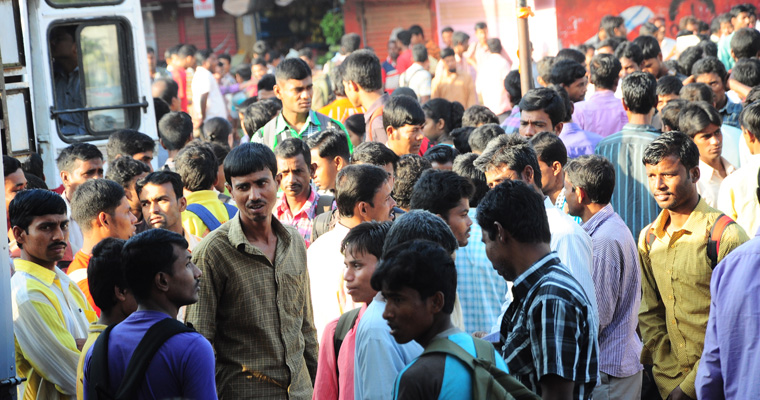Turbulence in Goan villages
Two weeks ago, malady Goa woke up to the news of a shocking murder of Hassan Khan, store a resident of Taleigao (a suburb of Panjim) who bought and sold second-hand cars. He also dabbled in the real estate business.
It turned out to be a hit ordered by a suspended former official of the Mining Department. But when I overheard a group of young Goans talk about the murder before the culprit was confirmed, one man instantly concluded? “Oh! It must be the work of a ghanti (migrant)”. Most of the rest in the group nodded vigorously in agreement.
‘Ghanti’ is a Konkani term with derogatory connotations, just like ‘bhailo’ or ‘voilo’, commonly used in local parlance to berate migrants.
A spate of recent crimes in Goa, some involving migrants and others where the culprits are unknown (but as is often the case, the migrants are blamed), has brought the issue of outsiders into sharp focus.
Migrants are increasingly being blamed for the crime wave, despite a lack of definitive evidence they are responsible for most of the offenses. And even if the crime rate is higher among migrants than the population at large, it is also true that the majority of the outsiders are law abiding citizens who have come to Goa to make ends meet, often performing tasks that locals are unwilling to do.
Early last month, Betalbatim, a village in the Salcete sub-district of South Goa, erupted as one voice against migrants residing there. The reason? an incident in which one Hassan Nagdekar, a Karnataka labourer, allegedly attacked a school girl with a knife after trying to molest her while she was on her way to tuitions.
Hassan was thrashed black and blue before the police arrived. He is charged with attempt to murder for the attack on the girl (which left her with only minor injuries), but is yet to be formally arrested because police say he is still in serious condition in hospital from the beating.
A couple of weeks after this incident, another Betalbatim woman was attacked and again the suspect was a migrant. A similar episode ensued, with villagers beating him up until the cops arrived and shifted him to hospital with a swollen face.
On the back of these twin attacks, Betalbatim residents and lay organisations linked to the local parish church publicly expressed their ire against the ‘influx of migrants’.
“Since all these incidents coincide with the unregulated entry of outsiders into the village, residents rightly feel that these outsiders are responsible for the spurt in crime,” says Franklin Fernandes, Executive Committee Member of the Parish Pastoral Council.
Hillary Cota, a member of the Betalbatim Civic & Consumer Forum, says the people will resort to vigilantism when the state and the justice delivery system abdicate their responsibility.
Migrant labourers working in industrial estates, at construction sites and as security guards have made homes in single room tenements built by landlords in spare properties surrounding their houses in several villages of Goa.
Unease with such migrants who are in Goa mostly because wages here are substantially higher than back home, is common across the state, especially in villages, where incidents like the ones in Betalbatim, trigger overt migrant bashing campaigns.
A little over four months ago, a similar clash between locals and migrants erupted in Loutolim, another village in the same Salcete sub-district following the murder of a 25-year-old youth. The agitated villagers even set fire to the house of the suspected culprit’s landlord.
Is this anger directed towards the migrant population in the subjective belief that they alone are responsible for all the crime in Goa, justified?
Chief Minister Manohar Parrikar stopped short of saying so when in the Goa legislative assembly he hinted that migrants are behind most crime.
“Many criminal activities happen with the involvement of people who work here as their background remains unchecked,” Parrikar said, adding that between 40 to 50 per cent of major crimes like murder and rape, had the involvement of construction and migrant workers.
“At least 15 to 20 recent murders have occurred at construction sites alone,” he added.
Parrikar, in the same debate, also revealed that his government will soon issue an advisory, under Criminal Procedure Code (CrPC) provisions aimed at preventing in-migration without establishing the character and backgrounds of the people coming in.
Labour contractors, who bring manpower for construction sites and for other menial jobs, will need to provide the police with personal details of the people they bring into Goa.
“Crimes are definitely linked to development here,” Parrikar said, while admitting in a way that most who come here do so only to fill the void in the local labour market, where the demand is high and takers among locals are few.
He said his government intends to train locals through the recently formed Human Resource Development Corporation in skills such as construction and security services and ensure outsiders currently working in Goa are eventually replaced with locally trained population.
Laxmi Lingayat Hossur, a maid from Karnataka who lives in Goa, argues that it’s unjustified to blame migrants for crimes only because in some incidents they are the culprits.
“Not all of us are criminals. We come here only because jobs are available. Apart from that there is no other reason,” Laxmi says. She said she’s often felt ostracized, and even puts her head down in market places to avoid confrontation.
“People do taunt, but this is foreign territory for us. We understand our place (in society) here,” she says, resigned to the injustice.
In another debate in the Goa Legislative Assembly, Parrikar mellowed his diatribe aimed at the migrants.
In response to a query raised by Santa Cruz legislator Atanasio Monserrate, he said the government does not keep records of migrants entering Goa on a daily or monthly basis.
Just being found without identity papers does not amount to being a crime in India, said Parrikar in reply to supplementary queries raised by Monserrate.
As for his promise to train locals for the jobs currently held by migrants, the question remains: Will the locals want that work?
.
.
.
.




